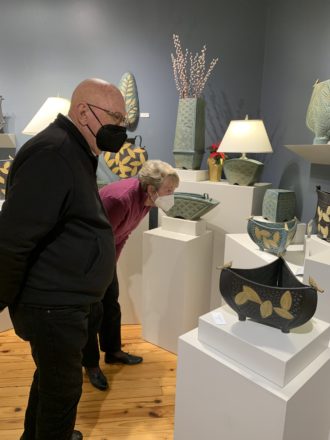When long-time Asheville residents Margaret Lancaster and Rick Ramsey opened Dog & Pony Show on Haywood Street in August, they knew one thing for certain: They were going to join the Go Local Card network.
“I had a Go Local Card, and so I knew the program and understood the program,” Lancaster says. “When we became independent shop owners ourselves, there was no question we wanted to offer a gift back to our community when shopping in our store.”
Dog & Pony Show is one of more than a dozen locally owned, independent specialty shops to join Go Local Asheville, the organization that administers the cards, in 2021. More than 500 businesses overall participate in the card program, now entering its 11th year.
Go Local allows businesses to offer discounts and freebies to people who buy the card and present it as they shop. Half of the money raised from selling each $20 card goes to Asheville City Schools; the program raised more than $34,000 for education in 2020 and nearly $200,000 since 2012.
“When a business signs on, they are saying they stand in solidarity with and support all local, independent businesses; they support our local schools; and they care about our locals,” says Michele Bryan, program and Go Local Card manager with Go Local Asheville. “For a free membership, it communicates many things about a business loud and clear to the community.”
The specialty stores that joined Go Local this year did so for a variety of reasons, ranging from a desire to support Asheville’s schools to a potential sales boost after pandemic-related slumps. But without exception, the owners interviewed by Xpress emphasized the importance of the program’s focus on supporting local businesses, particularly at a time when supply chain issues are plaguing national markets.
“By buying from local businesses, you support people who are making a living in your community, Lancaster says. “[You are] investing back into Asheville; this circle keeps our community vital.”
The show must go on
Dog & Pony Show was born when Lancaster lost her corporate job during the early days of the pandemic and she decided to pursue her dream of opening a business in downtown Asheville. She partnered with her friend Ramsey, a long-time community leader who spent many years chairing the Asheville Downtown Association board.
The store, located at 59 Haywood St., sells a mix of curios, including new products and gifts, locally made art and vintage items sourced from estate sales, antique shows and auctions.
Because of national supply chain problems, keeping the store supplied with new items has sometimes presented challenges. Some deliveries may not arrive on time or show up in erratic patterns, Lancaster says. But stocking work by local artists and vintage goods bought locally has not been an issue.
“We can go out in the community and find things,” she says. “We’ve had people actually bring things in. We’re very selective, but boy, if it’s something cool, we’re absolutely happy to have it in our store.”
More than that, she adds, the store can hand-deliver items bought by people living locally.
Grown local
Downtown Asheville businesses aren’t the only ones who benefit from Go Local. Herschel’s, a country store and farmers market that opened in Black Mountain in May, joined the program in September.
“Any conduit that serves to pair local businesses with the community is a win in our book,” says Andrea Walston, who owns and operates the store with her husband, James. “Our friends and neighbors work, eat and play here. Supporting each other helps our community thrive economically and socially.”

Local connections are particularly vital to a business like Herschel’s, which gets many of its products directly from local farmers, food producers and artists. The store sells fresh seasonal produce, meat, cheese, milk, local eggs, candles, soap, jams and jellies, jerky, local honey, old-fashioned glass bottle sodas and more.
“In our case, food is not shipped across the country, and in many cases, we have met and frequently converse with many of the people who grow and produce the goods and products we sell,” Walston says. “Local goods also tend to be less sensitive to the wild fluctuations in prices and current supply chain issues.”
Fueling recovery
Unlike Dog & Pony Show and Herschel’s, which opened in 2021, Ariel Gallery has been around for 20 years. The Biltmore Avenue artist-owned fine craft cooperative joined Go Local over the summer.
The gallery sells locally made craft products, including ceramics, glass, wood, furniture, fiber and jewelry. The artist/owners take turns working at the gallery.
“We were closed for 2 1/2 months last year at the beginning of the pandemic,” says Steven Forbes-deSoule, a gallery co-owner/member. “After re-opening, our business was slow at first but picked up in August. We decided to add Go Local to stimulate local business.”
So far, so good: Ariel has made a number of sales due to Go Local, Forbes-deSoule says, and he would recommend the program to other businesses.
Dog & Pony Show and Herschel’s say they haven’t yet seen tangible results from being part of Go Local — the stores are just now appearing in the program’s printed directory (included with this issue of Xpress) for the first time — but they expect to.
“I would always recommend a service that enhances the local community as this does,” Watson says.




Before you comment
The comments section is here to provide a platform for civil dialogue on the issues we face together as a local community. Xpress is committed to offering this platform for all voices, but when the tone of the discussion gets nasty or strays off topic, we believe many people choose not to participate. Xpress editors are determined to moderate comments to ensure a constructive interchange is maintained. All comments judged not to be in keeping with the spirit of civil discourse will be removed and repeat violators will be banned. See here for our terms of service. Thank you for being part of this effort to promote respectful discussion.